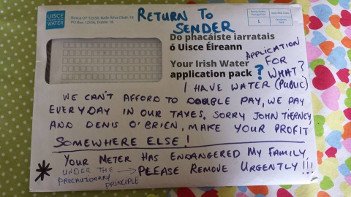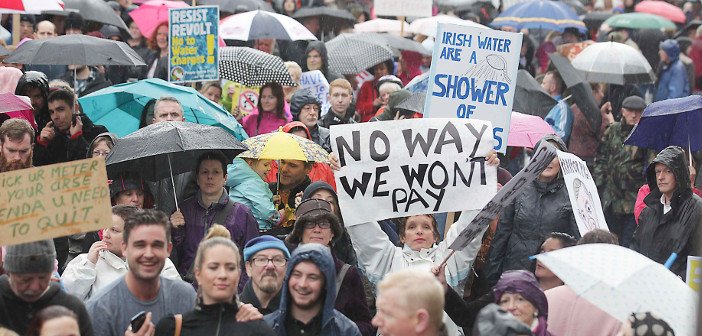A Social (Media) Democracy
On the 5th of August 2015, satirical website Waterford Whispers News published an article in which they posited the existence of a parallel universe. In this alternate reality, Irish billionaire Denis O’Brien faced prosecution by the Director of Public Prosecutions for bribery pertaining to the Digifone mobile phone licence, which, in actuality, was awarded in highly dubious circumstances. O’Brien’s solicitors, in a letter dripping with vitriol, demanded the article be taken down.

WWN removed it, but within hours editor Colm Williamson had posted the threatening letter from O’Brien’s solicitors on his personal Twitter page along with with the following caption:
“You know you’re doing something right when a multibillionaire megalomaniac sends you a cease and desist letter. #WAR”
The letter had been clearly marked ‘Strictly Private and Confidential,’ but no matter. The threat was now in the public domain where it was retweeted almost three thousand times. The public response was a mix of anger and hilarity at the intimidatory language against something that, while cutting almost impossibly close to the bone, was still satire.
I still can’t quite believe that the legal threat was posted online. It’s the digital-age equivalent of kicking Bishop Brennan up the arse. There is something joyous about the emasculation of a stern legal warning by simply showing it to the rest of the world. In a courtroom, O’Brien’s legal arsenal is formidable, but in the battlefield of social media it counts for naught. WWN’s wit, immediacy and public support - these count for everything.
Drawing his threats to their logical conclusion, what’s Denis going to do - sue? It would be, without exaggeration, global news: The country’s richest man, with a long history of alleged bribes, political ties and colossal debt writedowns sues a massively popular satirical website for an article set in a parallel universe…? That’s as good as Grisham, and would be a PR disaster for DOB.
As everyday inhabitants of social media we may take skirmishes like this for granted, but the power shift implied is phenomenal. Social media has absolutely changed what it means to be an Irish citizen.[pullquote]As everyday inhabitants of social media we may take skirmishes like this for granted, but the power shift implied is phenomenal. Social media has absolutely changed what it means to be an Irish citizen.[/pullquote]
For example, I get my Irish news primarily from my Facebook feed, where I am subscribed to a number of pages that aggregate Irish news stories. On my feed I can also see comments and posts from politicians, and clips of speeches from the Dáil. That the news has become so tailored is often bemoaned, but in a country like Ireland where there are relatively few outlets and many filibustering politicians, the digital whittling of news can be invaluable.
Take the example of Irish Water: It has been a catastrophic venture, generating uproar and protest - the latest of which saw 80,000 citizens take to the streets of the capital in mass demonstration.
But has IW been fundamentally different from any other Irish quango? Hardly. The practical difference is that through social media we have watched it being constructed in minute, horrifying detail and become single-click documentarians of every facepalm gaffe. Exorbitant consultants’ fees, laughing yoga retreats, u-turns on grants etc etc. It just kept on coming. And by sharing and discussing each of these insanities, regular folks suddenly felt that they were part of a political conversation from which they’d been previously shunned.

Granted, a single retweet or share of a news story is a tiny gesture, but it at least feels like a contribution. And aside from voting, it’s a more tangible political expression than most folks, myself included, could have hoped for a few years ago. It has sparked a sense of ability – a habit of active social contribution – that’s always been run of the mill on the continent but somehow absent on our island.
Old, corrupt Ireland is trying to live alongside this new, social media driven Ireland and it’s absolutely perplexed by it; to the point where the most sane response to a humorous web article is ashen-faced litigious fury.
Similarly, the relentless digital documentation of an online society is a nightmare for old school gombeen politicians. For one thing, it provides us with an unfiltered look at their opinions. Witnessing one Irish Water protest, Alan Shatter tweeted the following:
Todays anti democratic fascist thuggery outside Leinster House gives insight into the mindset of leadership of anti water charge groups
— Alan Shatter (@Alan__Shatter) July 1, 2015
The tweet sparked a rightfully outraged response. But more interesting than the ill-advised language of the tweet itself were the circumstances: Shatter almost certainly sent it in his car as he left the scene, probably shaken at the scale of the protest. There was no PR lackey present to buffer and reword it into something more palatable, giving us an unfiltered glimpse into the psyche of the Irish Politician: people who exercise their democratic right to protest are anti-democratic fascists and thugs.
Politicians uneducated in their own arguments are also having a tough time. When Senator Fidelma Healy-Eames made mention of a ‘Wiffy code’ instead of ‘WiFi,’ it made national news.
In the past, such a howler would have been relegated to a short, humorous piece in the Sunday Independent. Nowadays it’s retweeted endlessly, trends nationally, becomes a meme and forces an even better “dig up!” response from the politician where she intimated that she was using the French pronunciation of the word.
Coincidentally, at the time Healy-Eames was praising Senator Lorraine Higgins’ Harmful and Malicious Electronic Communications Bill. This proposed law, aside from being a ham fisted personal crusade is, in technological terms, precariously illiterate (the definition of online abuse at the core of the bill is anything that “intentionally or recklessly causes alarm,” which is so broad it could either be quite useless or quite dangerous).
So when someone like Healy-Eames, fervently arguing for the legislation, says ‘Wiffy code’ and it blows up on Twitter, it’s a healthy reminder that someone who doesn’t know the correct pronunciation of the term ‘WiFi’ has no business whatsoever discussing or voting on laws concerning free speech on the Internet. It’s also good because when we share and comment on it, we remember it. So the next time we hear about Higgins’ law, we recall the ineptitude of the folks involved in its inception and are far more likely to rail against it.
 Again, it’s exactly this collation and remembrance that has all but scuppered Irish Water. Had IW been set up twenty years ago, we’d see a scandal about it in the paper every once in a while. We’d acknowledge it, grumble, and go about our lives. Reports on the TV would anger us, but be offset with equivalent reports on the supposed ‘sinister fringe,’ out to destroy society. We’d think, ‘Well, I’m not like those people,’ err on the side of caution, and pay the charges.
Again, it’s exactly this collation and remembrance that has all but scuppered Irish Water. Had IW been set up twenty years ago, we’d see a scandal about it in the paper every once in a while. We’d acknowledge it, grumble, and go about our lives. Reports on the TV would anger us, but be offset with equivalent reports on the supposed ‘sinister fringe,’ out to destroy society. We’d think, ‘Well, I’m not like those people,’ err on the side of caution, and pay the charges.
But through social media, we see what’s happening on the ground. We bypass the major outlets and are in direct dialogue with each other. We see that others are not just annoyed or grumbling, but furious. We see unedited videos of the protests that belie the conservative news estimates. We see that the ‘sinister fringe’ are ordinary people at the end of their tether who are exercising their right to protest.
We see the folks who’ve had Irish Water bills sent to their long-deceased parents. We see Joan Burton smiling and making phonecalls in her car while the papers scream headlines of ‘false imprisonment.’ We see people fighting to stop water meters being installed by a company owned by Denis O’ Brien, who won the contract in highly suspicious circumstances…
…Which bring us right back to DOB and WWN. Social media has allowed us to consistently remind ourselves who people like O’Brien are, and what they represent. No longer are they distant, suited apparitions who appear before toothless tribunals and then disappear unscathed from our courts and consciousness. They are real, they are shared, they are remembered. DOB and his ilk simply don’t know what to do about this new level of public exposure and discussion. [pullquote] No longer are they distant, suited apparitions who appear before toothless tribunals and then disappear unscathed from our courts and consciousness. They are real, they are shared, they are remembered.[/pullquote]
So he resorts to what he knows best: threats and legal action. That’s not an atypical reaction. Fine Gael and Irish Water initially threatened non-payers with jail and made news of every instance of the supposed ‘violence’ at protests where there was virtually none. Protesters were even compared with the Islamic State. These institutes and politicians pounce on even the vaguest intimation of violence with an unnatural vigour. Why? Because they can understand it.
John Lennon said: “The establishment will irritate you – pull your beard, flick your face – to make you fight. Because once they’ve got you violent, then they know how to handle you. The only thing they don’t know how to handle is nonviolence and humor.” And that’s why DOB’s threat of legal action against WWN is all kinds of wonderful. He doesn’t know how to handle it so he throws money, threats, and solicitors at the problem. WWN calmly respond with more humour, and the threat is not only defused, but laughed at.
Through social media, institutions like Irish Water and individuals like DOB are being dragged out of their good-oldboy sanctuaries and put on constant public display, where they are being watched closely. They can no longer get away unnoticed with fudged accounts, sneaky bonuses and thoughtless, mealy-mouthed comments.
And that, for Ireland at least, is a revolution.
Thanks to Morna O’Connor for editorial goodness.
Images via villagemagazine.ie
facebook.com
irishmirror.ie
common dreams.org
